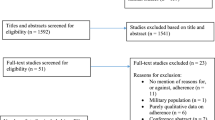Abstract
Objective: We had the impression that adverse reactions to standard antimalarial prophylaxis were reported much more often than stated by the package insert and medical drug references; and that side effects adversely affected compliance. Therefore, we evaluated adverse effects and compliance of the two standard malaria prophylactic regimens (mefloquine 250 mg per week and proguanil 100 mg twice per day) among short-term travellers. We expected that travellers who had experienced possible adverse effects on previous journeys might avoid antimalarial drugs on subsequent journeys (self-selection) and we therefore looked at adverse effects dependent on prior use.
Methods: The presence of neuropsychological and gastrointestinal symptoms were assessed by telephone interviewing of 300 travellers who had visited the travel vaccination service of our regional public health institute. Symptoms, prior use and non-compliance of 104 mefloquine users and 103 proguanil users were compared with 93 non-users in order to control for travel-related symptoms.
Results: Mefloquine showed the following adverse effects: depression [excess risk (ER) 7.2 per 100 users], dizziness (ER 9.3) and itching (ER 12.3). Adverse effects of proguanil were dizziness (ER 7.5) and nausea (ER 12.7). Adverse effects were mostly mild to moderate and occurred mainly during the time abroad. These results did not change when adjusting for age, sex, or destination. For almost every symptom, we found a remarkable difference between the relationship of symptoms and antimalarial drugs in first-time users and that in prior users: in the first-time users the relationship was positive, while in prior users it was absent or negative. This could be due to self-selection or adaptation to adverse effects. 22% of mefloquine users were non-compliant, whereas 35% of proguanil users were non-compliant. Adverse effects (experienced or expected) were the most often reported reason for mefloquine users to stop or even not to start taking the drug (42%). For proguanil, most of the non-compliant participants saw no point in starting or continuing its use (perceived uselessness 54%).
Conclusion: We can confirm the reports by users that adverse effects of mefloquine and proguanil are common and, although mostly mild, adversely affect compliance. We suggest that a longer run-in period for mefloquine as well as counselling travellers about possible adverse effects might improve compliance.
Similar content being viewed by others
Author information
Authors and Affiliations
Additional information
Received: 24 May 1996 / Accepted in revised form: 30 January 1997
Rights and permissions
About this article
Cite this article
Hoebe, C., de Munter, J. & Thijs, C. Adverse effects and compliance with mefloquine or proguanil antimalarial chemoprophylaxis. E J Clin Pharmacol 52, 269–275 (1997). https://doi.org/10.1007/s002280050288
Issue Date:
DOI: https://doi.org/10.1007/s002280050288




